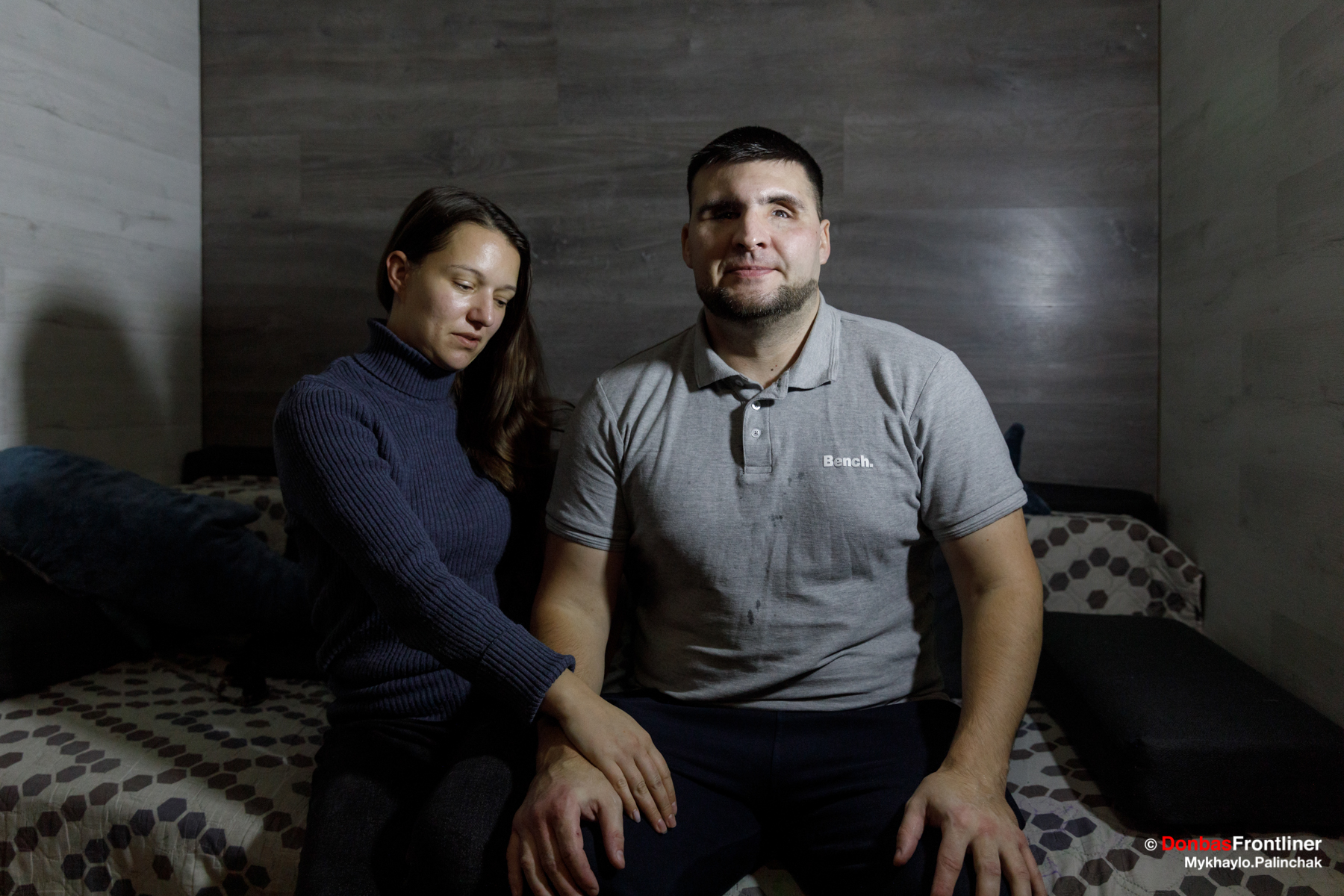An explosive Russian drone strike that “burst bright flames” from soldier Denys Abdulin’s eyes transformed the boxer-turned-soldier into one of Ukraine’s growing population of blind veterans struggling to rebuild their lives.
The true number of Ukrainian soldiers who have lost their sight in the Russo-Ukrainian war remains unknown. However, rehabilitation programs for the blind report a growing demand from veterans. Donbas Frontliner spent a day with Denys Abdulin, gaining insight into his new reality after the soldier lost his eyesight a year and a half ago in battle.
In the basement gym, a single light bulb casts a dim glow. One athlete stands out among the others with his dark sunglasses – Denys. He relentlessly pounds a punching bag with explosive power.
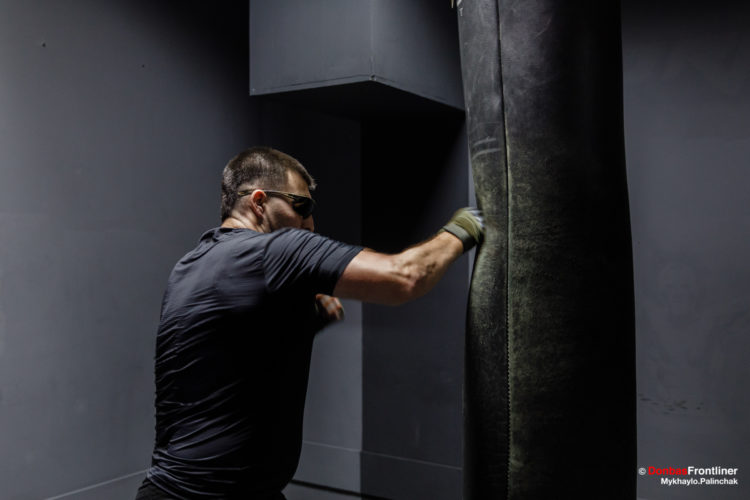
“What do you think, eh? I’m full of energy today, doing better than ever,” the brawny man says to his coach and friend after a round.
“Yeah, you’re really knocking it dead! Looking good!” the coach replies, closely monitoring his friend’s every move and providing water between rounds.
Denys trains at the gym three times a week when he’s not undergoing eye treatment and rehabilitation. The training offers him a chance to return to his prewar passion for boxing and a semblance of his former civilian life before 24 February 2022.
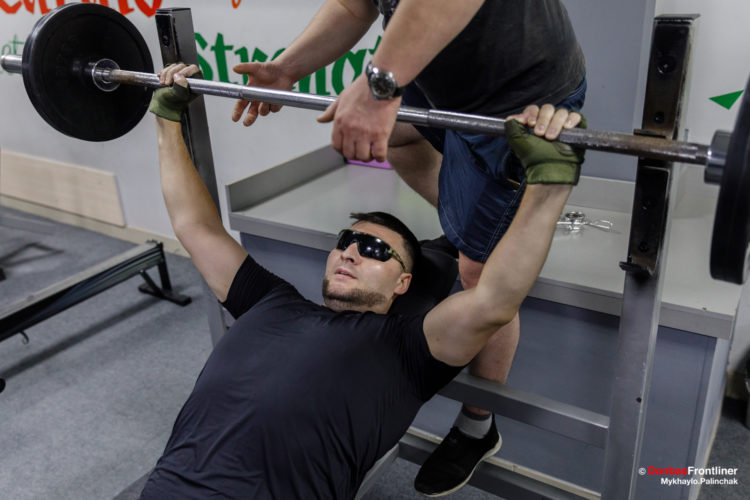
Before the war
Denys’s father introduced him to boxing as a child. He fell in love with the sport, winning city competitions in 5th grade and regional tournaments in 7th grade. In 2003, while studying to become an electrician, he won the national championship.
After a year of military service with the 95th Air Assault Brigade, Denys met his wife Lesia. They married and soon welcomed two sons, Davyd and Vadym. When war erupted in the Donbas in 2014, Denys volunteered for the front lines but was not called up for another three years. Representatives from the military registration office offered him training, which he accepted.
He expected deployment after finishing training, but it never came. So he attempted to join the National Guard, passing all physical tests before the medical board rejected him from proceeding further.
Denys did not believe the full-scale war would actually happen until the last moment. Even when a military buddy called on the morning of 24 February 2022, he assumed his friend had drunk too much. But once the reality of the Russian invasion hit home, Denys sent his family to Lithuania for safety and reported for duty. He joined the newly formed 115th Brigade.
After training, his brigade deployed to the Sievierodonetsk sector. For some time, his wife Lesia had no idea of his exact location. As she recalls:
“At first, he didn’t say where he was because he didn’t really know himself. Then one day, he said he was in Lysychansk. I looked on a map and saw Sievierodonetsk was right in the middle of hell, with Lysychansk just ahead of it. During the first month, the ambience was more or less positive – they still had water, electricity, and internet access. Then, all communications vanished. Every three or four days, he’d have to search for a place to contact me.”
Russian drones strike Ukrainian troop positions
According to command orders, Denys’s unit settled on the outskirts of Sievierodonetsk near the frontlines – Rubizhne to the west, already occupied by Russian forces, and Popasna to the east, occupied as well. Supply convoys could no longer access the area.
The brigade had just been formed, so Denys believes the brigade’s commanders lacked experience, resulting in poor decisions. Their unit was positioned in a young pine forest with trees barely over a metre high, leaving the soldiers visible from the air. But, orders were not to be disputed. The command marked the spot on the map, and this post had to be manned and defended.
One May morning, after returning from his post, Denys’s life changed forever.
“I’d just come in and started talking to my mate when a drone appeared… but we didn’t hear it. The drone spotted us when one guy exited the building. It struck the veranda three metres away. Debris flew everywhere – all five of us went down at once,” he says.
In a flash, he saw bright flames burst from his eyes, feeling his eyeballs explode a second later. Shrapnel pierced an unprotected area of his head, tearing through his right eye. His face was so brutally disfigured that the comrade who dragged Denys from the carnage did not recognize him.
Blood, sand and filth
Lesia did not immediately learn of her husband’s severe injury. With Denys often losing contact for days, silence was not unusual.
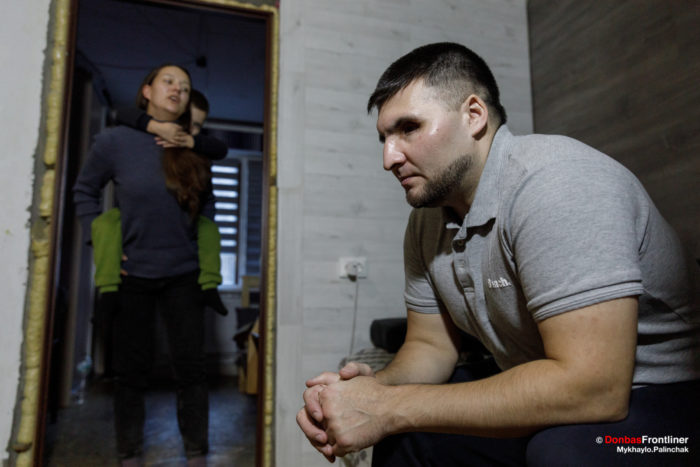
“Whenever I was on the verge of collapse, I’d write to his commanders – but no one responded; they were afraid to talk to me. His friends started writing and asking if I was really Denys’s wife, but no one dared explain what happened. When I finally reached Denys, he said he was hospitalized, probably blind for life. I just responded, ‘It’s okay, you’re still alive,’” she says.
Lesia returned to Ukraine with their sons, gathered necessities from home, left the boys with family, and rushed directly to the Dnipro hospital. Horrified by the sight, she found her husband still in bloody, sand-filled combat fatigues, utterly filthy and with an overgrown beard.
“No one had even changed or washed him. He was covered in blood and sand… I was desperate and began asking doctors for information, but the ENT specialist had locked himself away. For five days, Denys had tampons in his eyes, nose, ears – he could hardly breathe normally. The worst part was putting drops in his eyes. I told the nurses, and they said, ‘So do it yourself.’ I opened his eyelid – there was nothing there.”
A few days later, Denys was transferred to a Kyiv hospital for surgery. Doctors attempted to save one eye, putting him through seven painful procedures.
Living in darkness
Eventually, Denys returned home… permanently blind. For some time, his sons struggled to grasp the concept of blindness, not seeing anything. When Davyd noticed his father’s missing eyes, he pried open the eyelids to check for himself. But the boys came to understand their dad’s new reality, even using it for their own childish antics.
“Sometimes, when I’m alone and hear them raising a rumpus in the next room, I’ll come in to scold them. But they know that I can’t see what they’re doing. I enter and ask, ‘What are you up to?’ Complete silence. ‘Are you kidding me?’ They freeze, and no one moves. I start feeling my way around, touching everything. Then I hear them running around behind me and I start groping my way around the apartment trying to locate them,” Denys smiles.
For months after losing his sight, Denys endured panic attacks. As a psychologist, his wife Lesia explains that sighted people can redirect their attention outward to different objects, reading, films etc., during intense anxiety. Lacking that escape, Denys focused inward as he felt exposed and vulnerable. Lesia taught him to shift his awareness to sounds, picturing images in his mind, realizing no direct threat existed.
Now, all Denys can see are vivid, colorful dreams. But he works tirelessly to reclaim his life, although he understands it will never be the same again. Training helps him regain fitness, though surgeries and procedures force pauses. The boxer hopes to someday return to competitions as he once did.
He also found a new passion – attending weekend massage therapy courses. His dad taught him some basic techniques as a boy, but he had never considered professional training before his injuries.
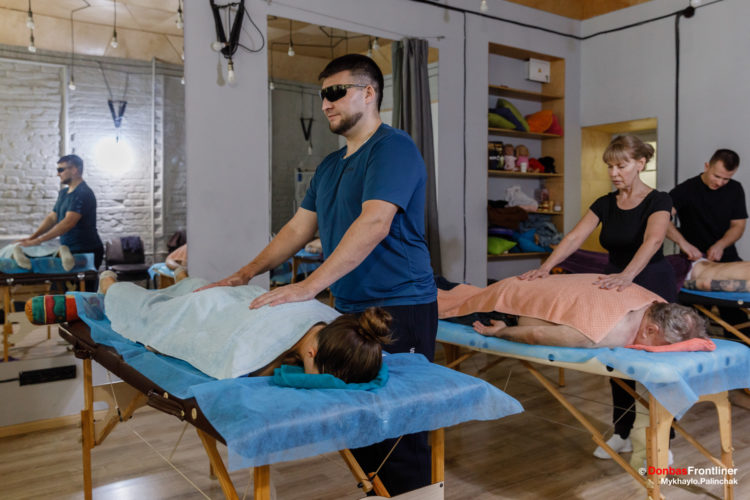
“At first, I didn’t think about what blind people could do. I have worked as an amateur massage therapist and have the patience to work on someone for a whole session. Also, I want to learn different techniques in the professional field, like sports and classical massage therapy,” he says.
Learning to navigate and cope
No state rehabilitation centers exist for blind veterans, but charitable groups run several programs. After his hospital release, Denys signed up for one of these programs and learned to navigate with a cane. But at first, he had to relearn his surroundings through touch.
Back home, he could recall room layouts from before losing his sight. Yet Denys still finds it difficult to fully adapt – everything must remain precisely placed, or locating items independently becomes almost impossible.
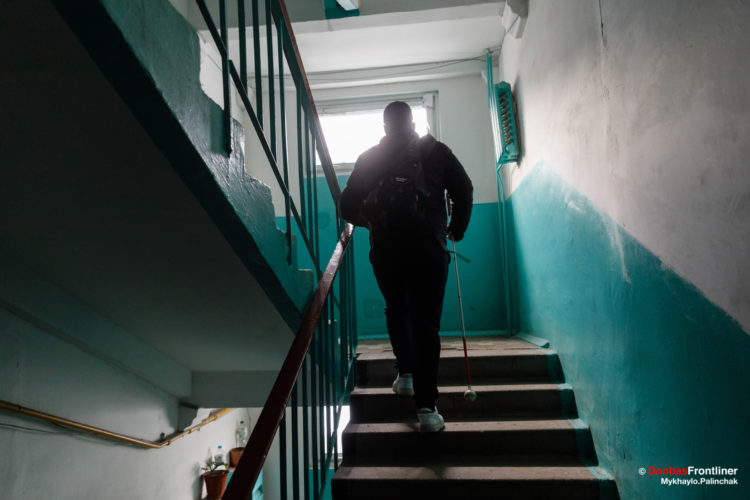
Initially, after returning, Denys would carefully venture only as far as the entrance bench, tracing the exact locations of stairs, porches, and doors in memory. Further trips required Lesia’s guidance.
“I told him, ‘It would’ve been better if you’d lost both legs, but your eyesight remained intact. At least you could still see, get prosthetics, and live your life. But blind, you can’t even pour tea safely, let alone boiling water. The world isn’t built for the blind’,” she remarks.
Today, Denys learns new routes by following the street curbs – he knows roughly where to turn for the neighborhood shop or café and where to cross the street safely. Illegally parked cars blocking his path or straying just a few paces off course necessitate calling for assistance.
Denys is too embarrassed to call out for help in public, so he avoids asking strangers to guide him. Some good Samaritans notice his cane and dark glasses and offer to walk him to his destination. However, the war veteran feels that most individuals still struggle to fully accept people like him.
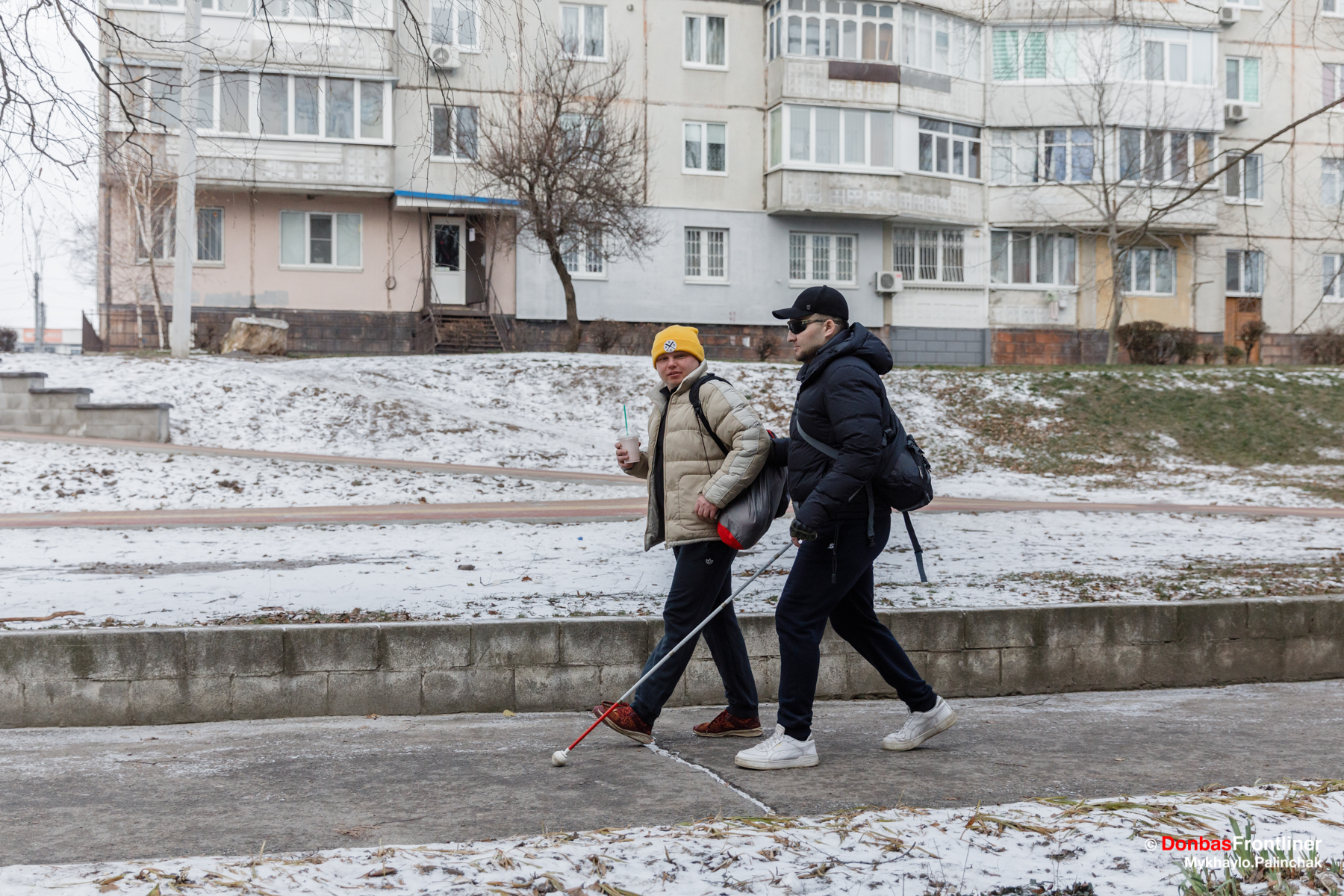
Hope for the future
Ukrainian doctors paint bleak pictures for Denys’s prognosis. However, Denys recently learned of bio-eye technology in development abroad.
“Research studies in different countries have reached certain stages; some testing has been done on animals, so it exists. It’s not fiction. We need state-level support to fund further efforts. I know I can raise money for surgery myself, and I don’t expect full state coverage, but Ukraine should pursue and develop this technology. Volunteers alone can’t afford the costs. These procedures are very expensive.” he states.
For now, a guide dog could greatly improve Denys’s daily life. Specially trained dogs memorize up to 40 routes, assisting the navigation of crowded streets and public transport, warn of obstacles, and retrieve fallen items. The Anteus Center currently trains such canine helpers in Mezhyhiria. To become more independent, Denys is fundraising 150,000 UAH ($4,000 USD) for his own guide dog. With some help, war veteran Denys Abdulin can regain mobility and purpose even without his sight. Please consider supporting Denys on his difficult road to recovery.
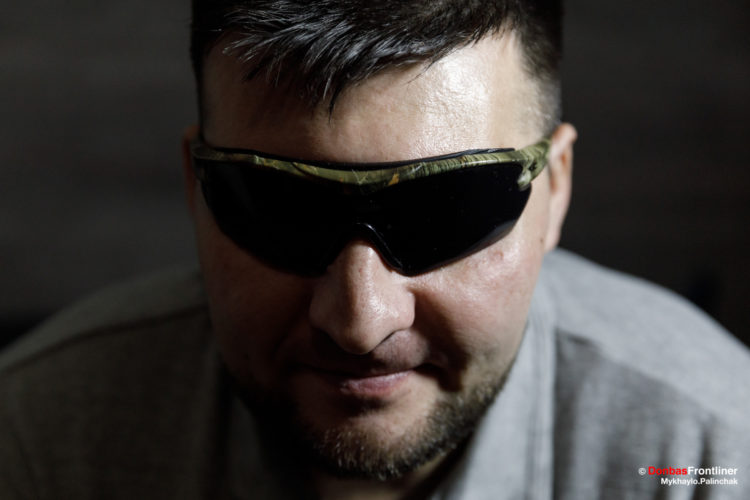
Denys Vadymovych Abdulin
IBAN / account number: UA623226690000026203017622981
Individual tax number (IPN): 3235604338
Oshchadbank JSC (Kyiv branch)

Donbas Frontliner is an independent interactive media outlet covering the military and hybrid war of the Russian Federation against Ukraine.
Translated by Christine Chraibi
Related:
- “I chewed that mouse between my teeth.” Ukrainian POW details torture, starvation in Russian camps
- Ukrainian soldier apostle faces gruelling rehabilitation after severe combat injuries
- Innovative Ukrainian online platform debuts for professionals assisting amputees
- Dances that heal: Ukrainian teacher helps the blind to adapt to new life
- Verified ways to help Ukraine and the Ukrainian Army




